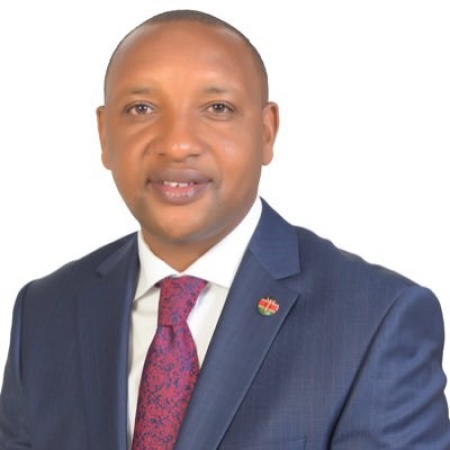

























Loading banners


NEWS EXPRESS is Nigeria’s leading online newspaper. Published by Africa’s international award-winning journalist, Mr. Isaac Umunna, NEWS EXPRESS is Nigeria’s first truly professional online daily newspaper. It is published from Lagos, Nigeria’s economic and media hub, and has a provision for occasional special print editions. Thanks to our vast network of sources and dedicated team of professional journalists and contributors spread across Nigeria and overseas, NEWS EXPRESS has become synonymous with newsbreaks and exclusive stories from around the world.

Lagos State received 58.5 per cent of all collections from the country?s non-import Electronic Money Transfer Levy (EMTL) revenue in June 2025, a presentation made by the Federal Inland Revenue Service (FIRS), confirmed by the Central Bank of Nigeria (CBN) at the July Federation Account Allocation Committee (FAAC) meeting has shown.
A THISDAY analysis of data from the meeting showed that total non-import EMTL collections for June stood at N30.3 billion, up N1.55 billion or 5.41 per cent from May?s N28.8 billion.
In all, in the first half of 2025, the records showed an aggregate of N183.7 collected through the EMT levy, which when paired with N37.3 billion from stamp duty, brought combined receipts for January to June to N221 billion.
The EMTL Is a charge imposed in Nigeria on bank transfers of N10,000 and above, whether the transfer is between individuals, businesses, or both.
It is a flat N50 levy per qualifying transfer, introduced under the Finance Act 2020 to replace the earlier stamp duty charge on electronic receipts. The CBN and commercial banks collect it on behalf of the FIRS.
It?s a non-oil revenue source for the government, with proceeds shared among the three tiers of government (Federal, State, Local) via the Federation Account, using a derivation formula based on where the transaction originated.
The concentration of June collections in Lagos was striking, but not surprising, with the state alone accounting for N17.7 billion of the total monthly pool. The index figure attached to Lagos in the state breakdown underscored its overwhelming share and corroborated why it dominates revenue flows derived from digital transactions.
By contrast, the Federal Capital Territory (FCT) came a far second position, collecting about N1 billion or 3.32 per cent; Rivers got N892.5 million or 2.94 per cent; Anambra N866.41 million or 2.85 per cent and Delta N796.6 million, approximately 2.62 per cent. No other single state reached more than a mid-single digit share of the national total.
The pattern Is consistent with a larger economic geography. Lagos is Nigeria?s financial and commercial hub, hosts the bulk of formal business activity, payment gateways and fintech volumes, and serves as the clearing point for many digital transactions that are captured by the EMT mechanism.
Besides, the structural reality produces large monthly remittances for Lagos, but also creates policy and political dilemmas. THISDAY?s checks showed that June?s overall uptick in EMTL receipts was a modest but positive sign, with the month?s total close to the six-month average monthly intake of N30.622 billion.
Another noteworthy feature of the mid-year accounts was the behaviour of stamp duty. Stamp duty receipts for May were exceptionally large at N11.907 billion, representing nearly 31.9 per cent of the six-month stamp duty aggregate of N37.341 billion.
From a macro perspective, the January?June totals showed that the EMT levy is a substantial and steady source of revenue, roughly N183.7 billion in six months, or an annualised rate that would make it a significant contributor to non-oil receipts if sustained.
On the other hand, the stamp duty component, while much smaller in aggregate, could swing sharply month to month and therefore complicates short-term revenue forecasting.
A breakdown showed that in January, approximately N4.4 billion was collected for stamp duty, while 21.4 billion was received by the federation for the N50 levy to arrive at N28.88 billion for that month, while in February stamp duty was N8.3 billion and EMTL was N36.63 billion, to hit N44.95 billion for the month.
In the same vein, in March, stamp duty collected was about N4.38 billion and EMTL was roughly N26 billion to reach N30.39 billion. Besides, in April, stamp duty collection was N5.45 billion and electronic transfer levy was N40.48 billion, to reach about N45.94 billion.
Besides, in May stamp duty receivables was N11.9 billion and EMTL was N28.8 billion, totalling N40.72 billion, just as June?s stamp duty collection was N2.79 billion and electronic levy was put at N30.3 billion, to hit N33.1 billion.
For the month of June under consideration, the least collectors were: Jigawa with N91 million in June; Gombe with N98.2 million and Zamfara state, which collected N104.7 million.
Also, FIRS yesterday announced the commencement of an electronic invoicing solution (e-invoicing) aimed at revolutionising tax payment in the country.
The e-invoicing system, also known as the Merchant-Buyer Model, is aimed at making tax compliance easier, faster and more transparent for all categories of taxpayers.
This was disclosed by the Special Adviser on Media to the FIRS chairman, Mr. Dare Adekanmbi, in a statement. He said the e-invoicing solution went live on August 1, following a successful pilot phase which began in November 2024.
Under the initiative, large taxpayers ? companies with annual turnover of N5 billion and more, are expected to be the first to be onboarded on the digital platform.
He pointed out that in less than two weeks of the initiative going live, no fewer than 1, 000 companies, representing 20 per cent of over 5, 000 eligible firms, had so far embraced the solution and commenced integration with the FIRS MBS platform.
The remaining large taxpayers are expected to onboard on or before November 1- the deadline for all the firms in the category to finalise their onboarding and integration processes.
The statement added, ?MTN Nigeria became the first taxpayer to transmit live electronic invoices to the FIRS, officially ushering in the e-invoicing regime.
?Huawei Nigeria and HIS Nigeria have also concluded test transmissions and are set to go live in the coming days.
?In collaboration with the National Information Technology Development Agency (NITDA), Service Providers have been incorporated into the ecosystem to act as both System Integrators and Access Point Providers. These providers will facilitate the onboarding, integration, and invoice transmission processes for taxpayers.?
The service, however, commended all large taxpayers, tax consultants, and service providers for their cooperation and commitment to the success of the e-invoicing project.
The service stated, ?We also acknowledge the genuine efforts of many taxpayers who strove to meet the 1st of August 2025 deadline but encountered operational constraints.
?In the spirit of encouraging voluntary compliance, the FIRS management has graciously approved a three-month extension of the deadline, with the new deadline now set for 1st November 2025.
?The FIRS e-Invoicing Implementation Team will continue to provide support through stakeholder engagements, including webinars, workshops, and town hall meetings, to ensure a seamless transition for all large taxpayers.?
The national e-invoicing solution is an electronic fiscal system (EFS) developed by FIRS to provide real-time visibility into commercial transactions and ensure the authenticity, accuracy, and completeness of invoices.
It is being rolled out in phases, beginning with large taxpayers and with those in the medium and emerging groups to follow.
The system aligns with global best practices and supports the federal government?s broader objectives of enhancing revenue assurance, reducing tax evasion, and modernising tax administration.
The Initiative is also a critical tool in the implementation of the Nigeria Revenue Services Reform Act, which seeks to harmonise revenue reporting and establish a single source of truth for government revenues.
Meanwhile, the Nigeria Extractive Industries Transparency Initiative (NEITI) has raised the alarm over the worrisome high debt exposure and weak fiscal management of many states, which is undermining grassroots development in the country.
The agency listed Kaduna, Ogun, Bauchi and Cross Rivers as states using between 10 to 30 per cent of their monthly earnings from the Federation Account Allocation Committee (FAAC) to service debts, leaving little to undertake developmental projects and programmes in their states.
The alert followed the release of NEITI?s latest Policy Brief ? ?Beyond Federal Allocations: The Cost of Borrowings and Debt Servicing at State Level in Nigeria?,
Which provides fresh, evidence-based insights into how debt servicing obligations are constraining states? capacity to fund essential services, local infrastructure, and poverty reduction initiatives.
In a statement issued yesterday by its Director, Communication & Stakeholders Management, Mrs Obiageli Onuorah, NEITI, through the brief, cautioned against what it described as a ?silent fiscal emergency? quietly undermining the economic stability of Nigeria?s states.
NEITI explained that the decision to undertake the research was rooted in its statutory mandate under the NEITI Act 2007 and in line with global Extractive Industries Transparency Initiative (EITI) Standards, which require disclosures on revenue allocations and subnational transfers.
The agency noted that states in Nigeria receive substantial monthly allocations from the Federation Account, much of it derived from extractive revenues.
It pointed, however, that, when between 10 per cent and 30 per cent of these allocations are deducted at source for debt servicing, the fiscal space for grassroots infrastructure, social services, and poverty alleviation is severely diminished.
By shedding light on the scale and implications of these deductions, NEITI said it was providing citizens, policymakers, and development partners with reliable evidence to drive fiscal discipline and prudent debt management.
The agency further noted that the study addresses a critical governance gap by complementing national debt management reforms with robust subnational fiscal transparency.
According to NEITI, high and unsustainable debt servicing obligations pose risks to state-level stability and undermine the developmental impact of extractive revenues.
Through this disclosure, NEITI said it empowers citizens, civil society, and the media to hold state governments accountable for their borrowing decisions, while providing a credible, evidence-based platform for dialogue on debt sustainability thresholds, transparent loan agreements, and responsible economic governance.
?The Policy Brief reveals that between 10 per cent and 30 per cent of monthly FAAC allocations in many states are directly deducted at source for debt servicing, leaving less room for grassroots development investment.
?Kaduna State recorded the highest 2024 deduction ratio at 32.06 per cent, translating to N51.2 billion deducted from N159.7 3 billion in gross allocations.
?Ogun State followed with 27 per cent (N33 billion from N123 billion), Bauchi with 26 per cent (N37 billion from N142 billion), and Cross River with 24 per cent (N28 billion from N119 billion)?, NEITI revealed.
From the NEITI Policy Brief, these high-debt states contrast sharply with low-debt performers such as Borno with only 2.63 per cent debt reduction obligations, Jigawa 2.74 per cent, Benue -3.58 per cent and Nasarawa -3.82 per cent) debt burden exposure.
It revealed that other states with low debt burden commitments included Kebbi 4.06 per cent, Bayelsa -4.46 per cent, and Anambra 4.54 per cent, where prudent borrowing and efficient fiscal management have preserved over 95 per cent of gross allocations for direct development spending.
The NEITI Policy Brief also examined Positive Debt-to-Gross Domestic Product (GDP) management implications and the lessons that subnational governments must consider.
NEITI noted that these low-debt states provide practical models for maintaining a healthy debt-to-GDP profile while still leveraging borrowing for development where necessary.
It explained that the balance between debt and revenue was critical for preserving fiscal sovereignty and avoiding dependency on future bailouts.
On the hidden liabilities and contractual risks, NEITI said the Policy Brief also flagged contractual obligations?notably in Ogun (N6 billion) and Ondo (N7.73 billion) tied to public-private partnerships (PPP) and infrastructure projects?warning that opaque contract terms and excessive deductions could undermine future fiscal space.
Conversely, it said 18 states, including Abia, Adamawa, and Akwa Ibom reported zero contractual deductions, signaling more cautious or strategically timed borrowing.
The agency also revealed inequality in the revenue sharing formula, pointing out that in 2024, Delta State received N581.27 billion ? five times the N108.32 billion received by Nasarawa.
Consequently, NEITI warned that such disparities, compounded by high debt-servicing ratios in smaller-allocation states, could deepen fiscal inequality and stall regional development.
NEITI Policy Brief also made some prescriptions for fiscal sustainability, recommending among others,, the establishment of State Debt Management Offices (DMOs) in all 36 states.
It also recommended mandatory real-time debt reporting and quarterly public disclosures as well as linking federal bailouts/support to improvements in internally -Generated Revenue (IGR) and fiscal transparency.
The agency also called for revising the revenue allocation formula to address vertical and horizontal imbalance, while equally canvassing capping contractual deductions and publishing the full terms of major borrowing agreements.
On its call for action, the NEITI Executive Secretary, Dr Ogbonnaya Orji stressed that the policy brief was ?not a name-and-shame exercise, but a mirror and a map? ? a mirror to reflect fiscal realities, and a map to guide states toward resilience, transparency, and equitable growth.
Orji cautioned that ?Debt, when managed efficiently, can be a tool for financing development at the grassroots. But when servicing obligations consume up to a third of monthly revenues, it becomes a threat to the future of public service delivery and economic stability.
The executive secretary affirmed that NEITI?s recommendations align with its mandate under the NEITI Act and Nigeria?s obligations under the global EITI Standards, particularly on debt transparency, subnational transfers, and revenue governance.
NEITI further pointed out that as Nigeria navigates a challenging fiscal landscape, the Policy Brief stands as both a red flag, a warning bell and a reform blueprint urging state and federal authorities to act decisively with bold reforms before debt becomes not just a burden, but a destination.
The agency said the Policy Brief, which was comprehensive with data, had been shared to the federal government including the National Assembly, relevant ministries, departments and agencies (MDAs) and the National Economic Council (NEC).
It added that the Brief had been widely circulated to the states? Accountants General and Commissioners of Finance as well as the Governor?s Forum, noting that the NEITI Policy Brief is also available on the NEITI website. (THISDAY)